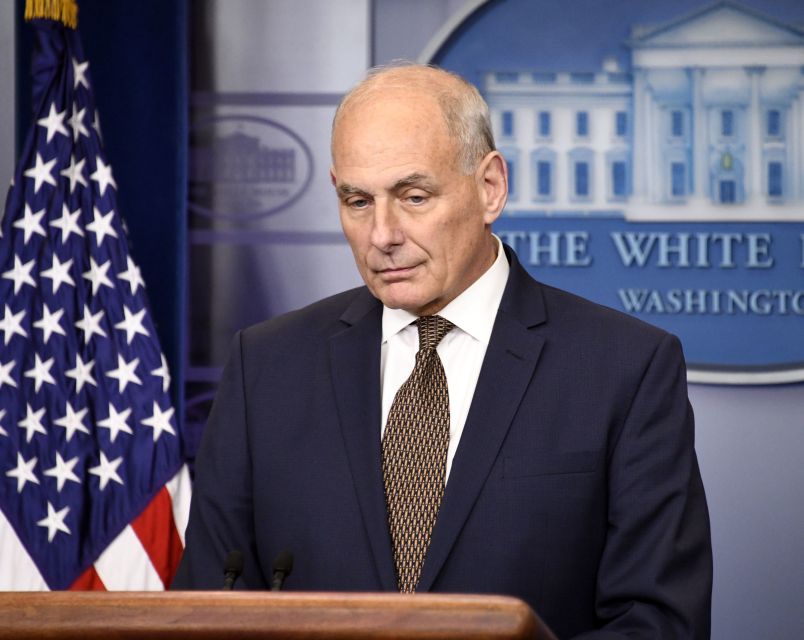Bloomberg reported Monday that President Trump exploded in anger at a statement from the Justice Department warning that it would be “extraordinarily reckless” to publicize what’s come to be known as the Nunes memo without a security review. In response, White House Chief of Staff John Kelly conveyed Trump’s anger to Justice Department officials and “lectured them on the White House’s expectations,” according to the report.
Those contacts by Kelly may have violated at least the spirit and perhaps the letter of the Trump administration’s own guidelines regulating communications between the White House and DOJ.
Discussions between Kelly and Justice Department officials related to “a criminal and counterintelligence investigation in which the White House and President have equities and a conflict of interest” would be strictly off limits, Andy Wright, associate White House counsel to President Barack Obama, told TPM.
The guidelines aim to create a firewall between the two bodies regarding ongoing criminal investigations—particularly those that involve the current administration. The possibility that they were breached is just the latest step in the ongoing politicization of federal law enforcement under Trump.
Since the Watergate era, incoming administrations have generally laid out updated guidelines regulating contact between the White House and Justice Department. The policy issued by White House Counsel Don McGahn in January 2017 limits communications to the DOJ to the President, Vice President, and White House counsel.
Those three principals are allowed to “designate subordinates” to communicate with similarly designated counterparts at the DOJ. But all such contacts “should be handled in conjunction with a representative of the Counsel’s office,” per McGahn’s instructions.
And the communications are supposed to be limited, with few exceptions, to matters of national security or cases in which the DOJ is defending the administration’s policies, as TPM has previously reported.
“The channel [of communications] is supposed to go through or at least be monitored by the White House counsel’s office in order to monitor the substance,” Wright said. “There is no business for the White House Chief of Staff to be calling in when the department is making a decision that relates to both a counterintelligence and criminal investigation. The DOJ determined that [releasing the memo] would be damaging to government interests.”
Matt Miller, who served as a spokesman for the Justice Department during the Obama administration, said the policy “is set up to allow some flexibility,” but that its spirit has gone unchanged across different administrations.
“The thing that’s always contemplated in these rules is that the White House and Justice Department will in no event ever talk about investigations that impact the White House,” said Miller. “That isn’t spelled out explicitly in the rules but that’s why these contact policies exist—because of all the pressure Nixon put on his DOJ” during Watergate.
Saikrishna Prakash, an expert on the separation of powers at University of Virginia Law School, cautioned in a phone interview that there were not enough publicly available details regarding Kelly’s contacts to know if he had violated the letter of the contact policy. If Kelly’s outreach was approved by McGahn or if a member of the White House counsel office had listened in, Prakash said, it could technically be acceptable.
But Wright pointed out that sharing the President’s personal opinion on an issue stemming from an open criminal investigation would undercut the entire reason such policies existed.
As McGahn’s own guidelines note: “In order to ensure that DOJ exercises its investigatory and prosecutorial functions free from the fact or appearance of improper political influence, these rules must be strictly followed.”
The White House did not respond to TPM’s inquiry about whether anyone in the White House Counsel’s office had any oversight over Kelly’s conversations. The Justice Department declined to comment on the record.
Kelly’s reported contacts are part of a pattern of White House attempts to tilt the scale in the Russia probe. That pattern also includes Trump’s own public comments, tweets, and previous reports of inappropriate contact between other White House officials and the DOJ.
Kenneth Starr, the former independent counsel who led investigations into President Bill Clinton, laid out the principle in a Washington Post op-ed last summer.
“The attorney general’s client is ultimately ‘We the People,’” Starr wrote, “and his fidelity has to be not to the president but to the Constitution and other laws of the United States.”







DT reminded Kelly that Clinton was not removed from office and told him to ask Starr what it feels like to be a loser.
This article is quaint. As if this Administration has any standards at all regarding contact with the DoJ. Can we at least please stop pretending already? The dotard doesn’t call it the “Trump Justice Department” for nothing.
The threat of interference with FBI and DOJ has less to do with Mueller than with 2020 elections. Every potential opposing candidate will be publicly investigated by FBI with DOJ commenting on pending charges. That is why the interference is so scary. We are very quickly moving toward the situation in Russia – elections without truly free elections.
This is not surprising. The rules don’t apply to them even their own.
I am shocked!, shocked I tell you! The venerable Gen. Kelly breaking rules? How can that be?
Oh, that’s right, he is servile to the Donald.